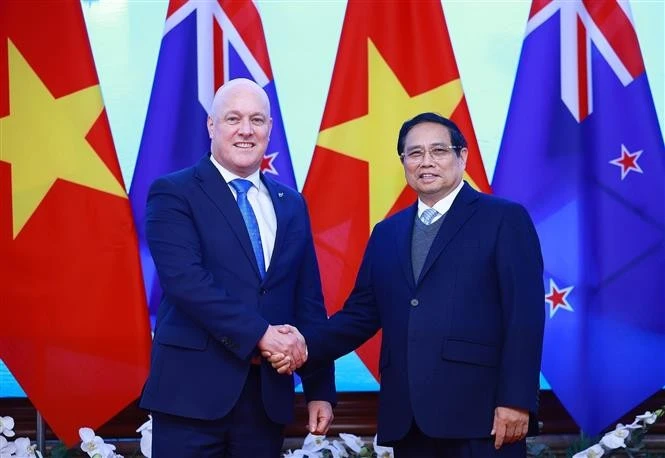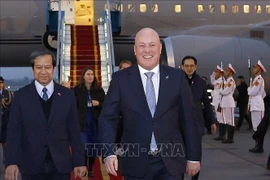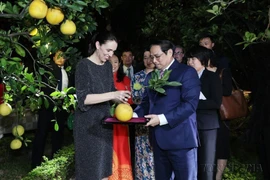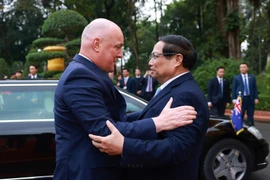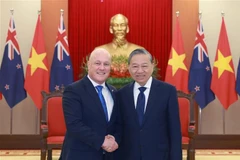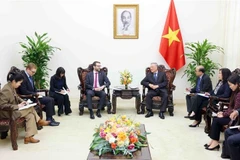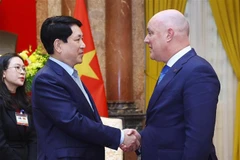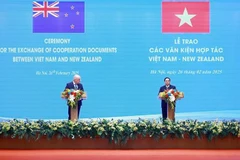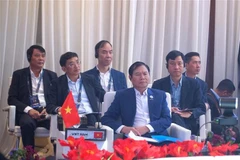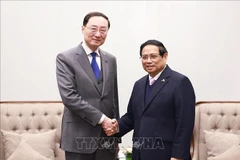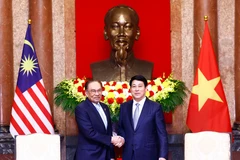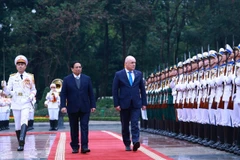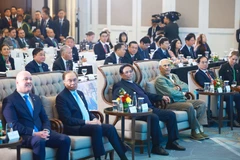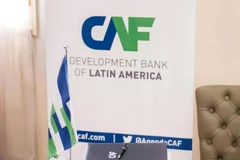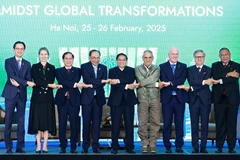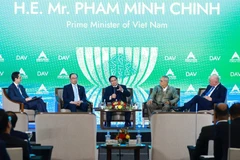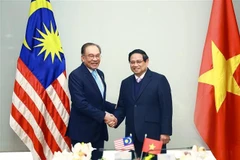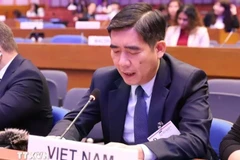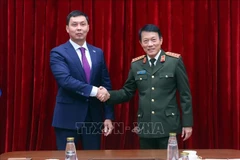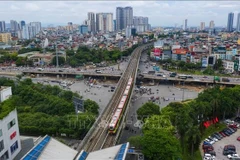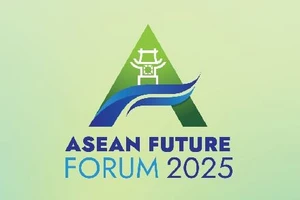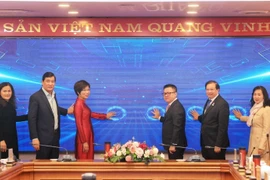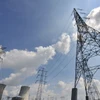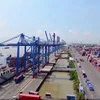Hanoi (VNA) – Vietnam and New Zealand issued a joint statement on the elevation of the bilateral relationship to a Comprehensive Strategic Partnership on the occasion of the official visit to Vietnam of Prime Minister of New Zealand Christopher Luxon from February 25-28.
Following is the full text of the Joint Statement
1. At the invitation of Vietnam Prime Minister Pham Minh Chinh, the Right Honourable Prime Minister Christopher Luxon of New Zealand paid an official visit to the Socialist Republic of Vietnam from 25 - 28 February 2025. During the official visit, the Right Honourable Prime Minister Christopher Luxon held bilateral talks with His Excellency Prime Minister Pham Minh Chinh, called on His Excellency General Secretary of the Communist Party of Vietnam To Lam, His Excellency President Luong Cuong, and His Excellency Chairman of Vietnam National Assembly Tran Thanh Man.
2. Since the establishment of diplomatic relations in 1975, and over the course of our shared Strategic Partnership since 2020, New Zealand and Vietnam have shared a vision for a stable, prosperous region. The relationship has flourished during this time, with engagement and cooperation between Vietnam and New Zealand growing steadily, both bilaterally and within subregional, regional and multilateral frameworks.
3. Building on this foundation, and driven by shared interest and mutual trust, the two Prime Ministers agreed to formally elevate the bilateral relationship to a Comprehensive Strategic Partnership, marking the 50th year of diplomatic relations. Over the next year a joint Plan of Action will be developed that will outline specific initiatives under the Comprehensive Strategic Partnership, which will focus on five main pillars for strengthened cooperation, namely: (i) political engagement, (ii) defence, security and oceans, (iii) economics, trade and investment, (iv) climate change, science and technology; and (v) education and people to people links.
4. The two Prime Ministers also reflected on the remarkable achievements witnessed during the term of the existing Strategic Partnership, across all pillars of the framework, including political engagement, security and defence cooperation, trade, investment, and economic connections, and multilateral engagement. The goal of the Comprehensive Strategic Partnership is to reinforce the framework for ongoing engagement between Vietnam and New Zealand, contributing to peace, stability, and prosperity both domestically and globally.
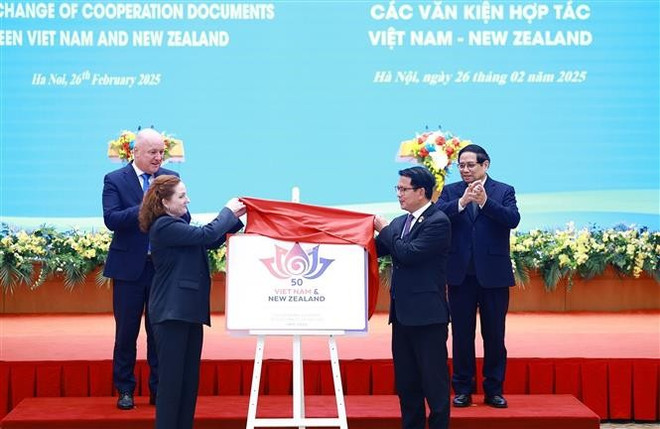
I. Strengthening political engagement
5. Since 2020 the Strategic Partnership has facilitated strengthening political engagement through more frequent bilateral political cooperation, high-level exchanges between political parties, parliamentary and governmental delegations, and in particular regular meetings between Prime Ministers. Vietnam and New Zealand are committed to further strengthening engagement at senior official, ministerial, and leaders’ levels in bilateral, regional, and multilateral fora on the basis of respect for international law, equality and sovereignty, independence, and territorial integrity. There will also be greater cooperation on various multilateral, subregional, and regional issues via both governmental and parliamentary channels.
6. The two sides reaffirmed their commitment to ASEAN Centrality and reaffirmed ASEAN’s fundamental role in the evolving regional architecture that is open, transparent, inclusive, and rules-based, built upon ASEAN-led mechanisms, and which safeguards the sovereignty and interests of all states, regardless of their size.
7. The two sides reaffirmed their commitment to enhancing the ASEAN-New Zealand relationship in 2025, the 50th anniversary year of dialogue relations between ASEAN and New Zealand. The two sides looked forward to marking this significant milestone at the convening of the ASEAN-New Zealand Commemorative Leaders’ Summit and associated events in October 2025. New Zealand welcomed Vietnam’s current role as Country Coordinator for ASEAN-New Zealand Dialogue Partnership. Vietnam welcomes New Zealand’s intention to establish a Comprehensive Strategic Partnership with ASEAN in 2025.
8. The two sides agreed to deepen the coordination between Ministry of Foreign Affairs of Vietnam and Ministry of Foreign Affairs and Trade of New Zealand and strengthen cooperation on Track 2 diplomacy by promoting regular exchanges on strategic issues between think‑tanks based in the two countries.
II. Deepening defence, security, and oceans cooperation
9. Over recent years the two sides have demonstrated closer defence cooperation including through high-level defence visits, strategic dialogues, education and training, capacity building for United Nations peacekeeping operations, information exchanges, naval cooperation [AT1] and enhanced cooperation in the ASEAN Defence Ministers' Meeting-Plus forum. Building upon our recently agreed Defence Cooperation Plan, the two sides seek to strengthen cooperation through existing dialogue and engagement while exploring cooperation in potential fields that are appropriate to the Vietnam – New Zealand relationship, and to the capability, demand and interest of each country.
10. The two sides underscored the significance of information sharing, engagement, and strengthening cooperation on a range of bilateral, regional, and international issues of mutual interest such as climate change, e-government, contributing to the work of the United Nations Human Rights Council, [JM2] [AT3] science and technology, countering terrorism, as well as combating all types of crimes including drug trafficking, money laundering, people smuggling and human trafficking. They agree to explore the negotiation and signing of potential bilateral agreements in the security field, in accordance with each country’s practice.
11. They welcomed the inaugural Oceans Dialogue between officials which marked the beginning of regular dialogue on approaches to address maritime challenges and seek opportunities to enhance civil maritime cooperation through knowledge exchanges, capacity building and training. They committed to continue working closely together to carry out other maritime cooperation programmes.
III. Supporting closer economic, trade, and investment partnerships
12. Trade, investment, and economic ties will be a central focus of the new Comprehensive Strategic Partnership. During their meeting the two Prime Ministers highlighted trade cooperation as a key component of the relationship, for the direct benefit of our people and businesses. The two sides previously agreed a two-way trade target of 3 billion USD in 2026. To that end, the two sides committed to individual and joint actions in standards development and trade facilitation, information exchange, market access enhancements, and collaboration between our customs and other relevant agencies.
13. Both sides re-dedicated themselves to deepening regional economic integration. The two sides pledged their unwavering support for the rules-based, free, open, transparent, and inclusive multilateral trading system, including reform of the World Trade Organization. In this regard, the two sides reaffirmed their commitment to the full and effective implementation of the Comprehensive and Progressive Agreement for Trans-Pacific Partnership (CPTPP), Regional Comprehensive Economic Partnership (RCEP) and the Agreement Establishing the ASEAN-Australia-New Zealand Free Trade Area (AANZFTA).
IV. Promoting cooperation on science, climate change, and technology
14. Further cooperation through New Zealand's sustained bilateral and regional official development assistance remains a priority, particularly in areas of New Zealand’s strength and Vietnam's priority such as high-quality human resources development, women’s empowerment and gender equality, climate change and economic resilience, sustainable water management, agriculture, and disaster risk management.
15. The two sides recognised the urgent need to reduce greenhouse gas emissions in accordance with the latest findings of the Intergovernmental Panel on Climate Change and the importance of adapting to climate impacts and reaffirmed their commitment to the goals of the Paris Agreement. The two sides are committed to supporting existing initiatives of which both countries are members, including the Global Research Alliance on Agricultural Greenhouse Gases. Both sides share a common aim to reduce the impacts of climate change and prepare for its future impacts, including through the transition to a net-zero greenhouse gas emissions economy that is just, inclusive, cost-effective, evidence-based, and that enables private investment and partnerships, access to the best available technologies knowledge sharing and competitive markets. To this end, the two sides have signed a Memorandum of Arrangement on Climate Change Cooperation and will strengthen cooperation on adaptation and mitigation, including carbon markets.
16. The two sides committed to further enhancing bilateral agriculture cooperation to support Vietnam to become a climate-resilient and modern agriculture producer. This is including through joint research, collaboration, and action on climate change, climate-smart agriculture, technical assistance on plant health laboratory accreditation, plant breeding, and commercialisation of agriculture products.
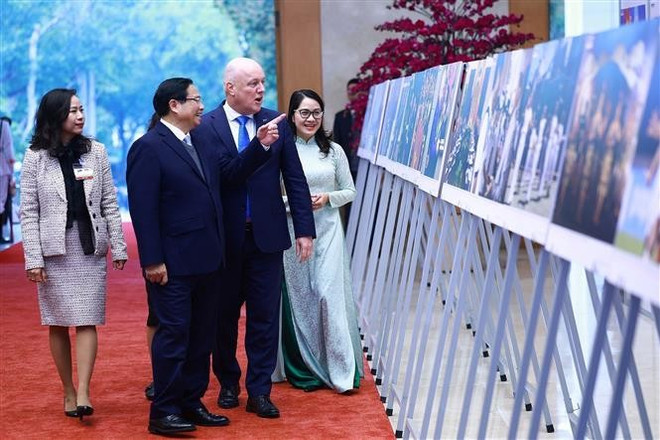
V. Continued promotion of Education cooperation and People-to-People connections
17. People-to-people links, particularly education and training cooperation will be a key element of the new comprehensive strategic partnership. Recent years have seen increases in the number of Vietnamese students in New Zealand and New Zealand students in Vietnam, joint programmemes between our higher education institutions, cooperation in technical, vocational and English language training, scholarships granted to Vietnamese youth and officials to study in New Zealand, scholarships granted to New Zealand youth to study or intern in Vietnam, and student, teacher, and academic exchanges. New Zealand committed to support training of Vietnam’s Government and local officials, including in English.
18. The two leaders highly appreciated the implementation of Education Cooperation Arrangement between Ministry of Education and Training of the Socialist Republic of Vietnam and the Ministry of Education of New Zealand, signed on November 2022. During Prime Minister Luxon’s visit the New Zealand Government announced an increase in scholarships and confirmed that it will continue to deliver the ELTO programme and assist Vietnam in English language training. The two sides also encouraged and supported continued higher education institution cooperation in joint training programmes.
19. The two sides agreed to promote cooperation on culture, sport and tourism, which could include exchanges, participation in international cultural and sporting events and travel fairs. They discussed the importance of enhancing flight connections between the two countries.
VI. Strengthened Multilateral, Subregional and Regional cooperation
20. The two sides underscored the importance of ASEAN centrality in promoting ASEAN’s subregional development including the Mekong subregion. The two sides reiterated the commitment to further promote the peaceful, prosperous, inclusive, sustainable development of the Mekong subregion through the Mekong River Commission (MRC), the Ayeyawady – Chao Phraya – Mekong Economic Cooperation Strategy (ACMECS), the Friends of Mekong (FOM), and other key Mekong institutions and related initiatives.
21. The two sides reaffirmed their commitment to multilateralism and the rules based international system anchored in the UN Charter and International Law, as fundamental underpinnings of peace, security and prosperity. In particular, the two sides noted the obligation of all states to adhere to international law and they reaffirmed the status of the United Nations Convention on the Law of the Sea (UNCLOS) as the Constitution of the Oceans. The two sides expressed deep concern over developments in the South China Sea and called on all parties to exercise self-restraint, avoid actions which escalate tensions or erode trust, and to resolve disputes through peaceful means, including full respect for legal and diplomatic processes without resorting to threat or use of force, in accordance with international law including UNCLOS.
22. The two sides committed to closely cooperating and supporting each other at multilateral fora. They underscored the special importance of upholding the rules based international system anchored in the UN Charter and International Law, independence, and territorial integrity and sovereignty of all nations as enshrined in the UN Charter./.
